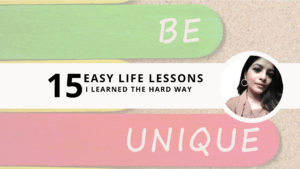Today most people have the least tolerance towards things happening around them. This has caused them to behave rudely most of the time, even when they don’t intend it. Be it everyday stress or just life, being rude feels more easy than being assertive. But, the truth is you can do it. This is exactly what we are learning today.
Communication is one of the most essential soft skills. It is the most basic criterion for any job profile.
In truth, expressing yourself is an art. Not everyone is good at it.
You might know someone in your neighborhood who is everyone’s favorite. Even without being very handy! Do you know why?
Because they know the power of communication. That is why everyone wants to know their opinion.
But when you express your opinion. Have you ever been called rude?
If yes, you need to learn to be assertive. Let’s help you!
17 Honest Ways of Being Assertive Without Being Rude
By being assertive in your communication you can express your opinion without any filter.
Have you ever thought about why people still find it a challenge to express themselves even after knowing that they can easily express themselves by being assertive?
It’s because most of us misunderstand assertiveness.
Assertiveness is not being devious, it is not being rude or upfront without considering other’s feelings. Instead, it requires way more emotional intelligence than any other communication skill.
The Difference Between Being Assertive and Rude
There are times when being assertive and being rude may appear analogous. But in fact, these are two different approaches.
The way the speaker perceives and judges the situation is fundamentally apart.
An assertive person will deliver their opinion firmly. They will also listen and respect other’s opinions even if those opinions are not something they agree to.
But being rude means imposing your opinion on others without considering their perspective at all.
When you are being rude, you are compromising on your capability to understand other’s opinions.
Rude individuals are the worst listeners. Being assertive, on the other hand, makes you a great listener because you value other’s perspectives and points of view.
Usually, they both say No. However assertive individuals are more logical and firm with their opinions instead of being emotionally overwhelmed and rude in their approach.
17 Ways of Being Assertive Without Being Rude
Your emotions are a wide shade of spectrum instead of just being happy and sad.
Understanding your emotions and feelings is essential to improve your communication skills. Hence, here are 17 ways in which you can practice being assertive in your daily life without being rude.
1. Watch Your Tone
Your tome plays a significant role in your conversations. At what pitch you are talking, will mainly decide how the listener is perceiving it.
If your tone is unnecessarily high, it might force the listener to consider your words as rude. Thus, using an appropriate, medium-pitched tone is essential for effective communication.
2. Body Language
To communicate in the right manner, it is important that you make eye contact with the listener while keeping your posture relaxed and upright.
Crossing your arms may indicate a defensive approach. Thus, it is better to avoid it.
Don’t fidget. The constant movement of the hand and legs may indicate self-doubt. Instead, make natural hand gestures to highlight certain points during your conversation to emphasize more on them.
3. Facial Expressions
Your facial expressions are a mirror of your emotions. They easily give away to the listener what you may actually be feeling regarding the situation.
Therefore, avoid making weird expressions and keep your face neutral. You may smile a little to create a positive ambiance.

If feel less confident about your facial expression, you can practice them in front of your mirror.
4. Be a Good Listener
Despite feeling strongly about your opinion, being assertive means you still listen to what others are saying.
If you don’t, it may look like you are imposing your opinion on others which can easily translate into people perceiving you rude.
Hence, don’t just hear others. Be attentive enough to listen to others with all your ears.
5. Learn to Say NO
Don’t be overwhelmed by situations where you may have to say NO.
Some situations and circumstances might require you to say no and there is nothing wrong in doing that.
While saying no may not always be the easiest thing, it is important to keep your No loud and clear. Don’t fumble.
You mustn’t feel guilty while you are saying No. Because declining your involvement in some places or situations is not always about others, it is about your peace of mind too.
6. Using ‘I’ in Your Conversations
Using ‘I’ in your statements will show that you strongly believe in yourself and you are not accountable for adhering to others’ opinions.
In such situations, it may help you express a firm stand on your opinions.
7. Avoid Using ‘should’
Using ‘should’ in your conversations with others may make you sound authoritative. Hence, to have positive and collaborative conversations, it’s better to avoid using it and should be more considerate and respectful towards others.
Replace ‘should’ in your conversations with ‘would’. This makes you sound determined to express your personal experience or learning without hampering other’s dignity.
8. Don’t Compromise
There will be times when situations can make you feel vulnerable. In such cases, it is important to not compromise on your integrity, self-belief, and well-being
In fact, compromise is essential for collaboration, but if your actions are not respected then it’s essential to be assertive and take a stand for yourself.
However, if your actions are acknowledged, listened and respected, there is no harm in healthy compromise.
9. Empathy
If you are involved in delicate matters and your opinion doesn’t align with others. Then it’s better to be firm about your opinion but in an empathetic way.
This means you understand the sensitivity and delicacy of a situation and you are optimistic about your opinions.
Because in these situations you may have to deal with people’s emotions with logic and this can be very tricky.
Therefore, don’t rush and explain yourself clearly and slowly, and most importantly be open to other people’s opinions.
10. Don’t Control Anyone
Being assertive means expressing your thoughts with self-assurance. It means to not control and manipulate others.
As an assertive person, you don’t restrain others from sharing their opinions. If you do, that makes you rude and inconsiderate.
However, while you acknowledge other’s opinions, it is important to not let anyone else manipulate your thought process.
11. Walk away
If you find yourself in a situation where your opinion is not even listened to, choose to walk away.
In such situations, if you lose your calm and raise your voice, you would be called rude, irrespective of the optimism in your opinions.
Hence, walk away from people, places, or situations where you are not valued.
13. Use Your Words Wisely
Out of everything you own, your words are the most powerful weapons.
What words you are using to express your opinion can change the whole perspective of the listener.
For example, consider these two statements:
“Your idea is stupid, just follow me”.
“I appreciate your input but I firmly believe my opinion is easy to implement.”
In both statements goal is one but how we are saying it is poles apart. This is exactly why it is important to choose the right word in your conversations.
14. Be Open to Criticism
Expressing your opinions can bring some after-effects like strong criticism. The right way is to not consider such constructive feedback as a personal attack.

The key is to accept it and manage it assertively by keeping your emotions in check.
Acting on such criticism could be an opportunity to understand different opinions and mindsets.
15. Clarity of Thoughts
Being assertive means you have clarity of thoughts. This helps you to stick to your opinions and perspectives without being influenced by others.
With clear thoughts, you also have the mental stability to not be biased to any particular side and instead stand by what you truly believe in.
16. Take a Responsibility
Being assertive means being answerable for your words and being accountable for the consequences.
Being assertive means you are responsible for your opinion. It means you don’t flip from what you said or did.
Your self-assurance regarding your opinions is important as it empowers your point of view to others as well.
17. Practice
Assertive communication is a skill. Just like other soft skills, you can improve it by practicing it.
No one is born with skills. The key is to practice them by learning from your mistakes.
You need to put your trust in yourself and start communicating with others.
This is the most basic criteria to begin working on yourself and thrive in your efforts.
Conclusion
Assertive Communication is an acquired skill just like swimming.
To learn this skill you have to understand its importance and most importantly you should enjoy having a conversation with others.
Even if you are an introvert, you can build your communication skills and become an assertive speaker.
The key is to start practicing being assertive by approaching one way at a time mentioned above. You may even join a club or go out to various get-togethers to put yourself out of your comfort zone.
Being assertive makes you more understanding of the ambiance and emotional nature of others. It’s not only words but also how you say them that matters.
Hence don’t take setbacks to heart, practice this skill just like you would do any other, and believe in yourself to be assertive!
If you enjoyed reading this, here’s another guide for you to overcome your loneliness without friends.



